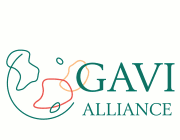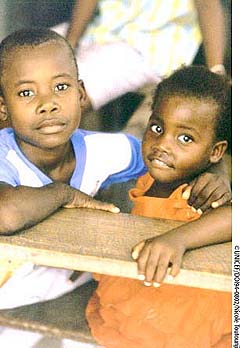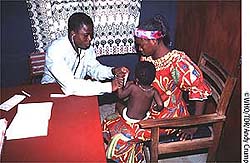 |
|
|
Immunization Focus August 2000 Return to August 2000 contents page NEWS Health promises at the G8 summit: the challenge is to deliver Table of countries approved for Fund support A PROMISE to give priority to expanding children’s immunization was among the less-widely reported outcomes of the summit of the Group of Eight (G8) major industrialized nations in Okinawa, Japan, which ended on 23 July. But after a summit widely criticized in the world’s media for its lack of real progress, all eyes are now on those responsible for turning promises into action.
New money has been promised from two of the rich nations: Japan will allocate US$3 billion in assistance to low-income countries for infectious and parasitic disease control over the next five years; and the United Kingdom is to double to US $160 million over the next three years, its development assistance for improving access to drugs and technologies for major communicable diseases. The European Commission, whose president also attended the G8 summit, is also understood to have promised significant new funding although no statement or specified sum had been announced as Immunization Focus went to press. The leaders in Okinawa also heard confirmation that the International Development Association, the World Bank’s concessionary lending arm, would treble its provision of credit to combat AIDS, malaria, TB and childhood diseases, including immunization, to at least US$1 billion.
Besides setting targets on the three major killer diseases, the G8 communiqué also sets out a broader agenda which will need to be addressed if these targets are to be achieved. This includes "the development of equitable and effective health systems, expanded immunization, nutrition and micronutrients and the prevention and treatment of infectious diseases". And it commits the G8 nations and their partners to work "to make existing cost- effective interventions, including key drugs, vaccines and preventive measures more universally available and affordable in developing countries". Reference 1. G8 Okinawa Summit
Phyllida Brown
Return to Aug 2000 contents page
|
|
|
|
Copyright © GAVI |

